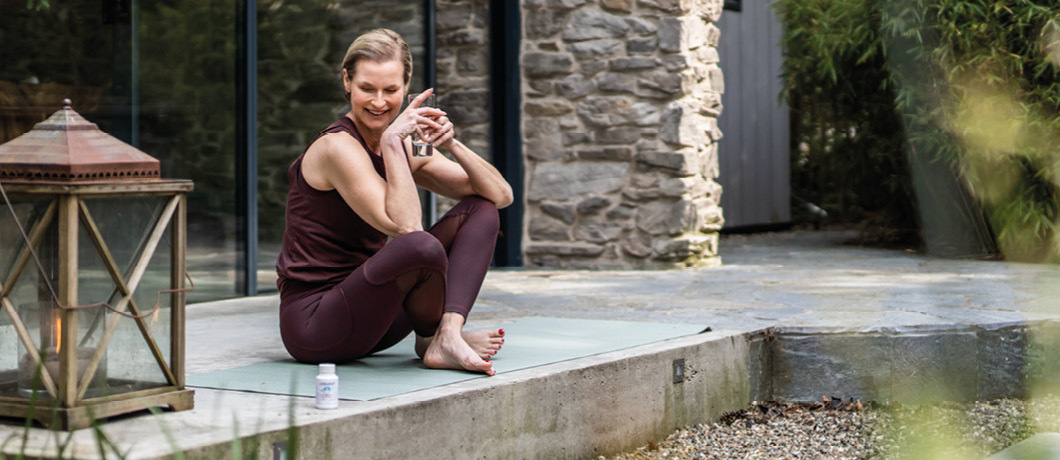Stress management: Ways to relieve and reduce stress

Although beneficial in the short term, stress is a natural reaction that can wreak havoc on our physical and mental well-being in the long term. For advice on reducing stress, and to see how CBD can influence stress management, keep reading.
Contents:
Why managing stress is important
Managing the physiological impact of stress is paramount, not least of all because we can never eliminate stress entirely. Whether it's at work or home, stressful situations crop up daily, and unfortunately, avoidance won't make them go away. Instead, the best approach to stress is learning to live with it and keeping levels manageable.
Learning to deal with stress and practising stress-management techniques can help you take control and be more productive. Not only will you feel happier, but your body will thank you too. While stress is an incredibly personal feeling, one fact remains the same no matter who you are—chronic stress has a significant impact on mental and physical health.
The impact of stress on your health
The problem with stress is that it isn't limited to small or insignificant symptoms. Instead, chronic stress can affect just about every process in the body, severely disrupting one’s quality of life. The list is extensive, but common symptoms of stress include:
• Increased risk of depression
• Low sex drive
• Headaches
• Tiredness
• Weakened immune system
• Increased heart rate and breathing
• Difficulty concentrating
• And much more!
While the sheer volume of symptoms appears daunting, and at times impossible to tackle, there are dozens of positive actions you can take.
How to manage stress
Lifestyle plays a crucial role in stress management, but we often forget to give our bodies time to process and understand why we are stressed. Of course, not all societies live this way. In fact, scientists discovered that people living in what they called “blue zones” exhibited much lower stress levels and could manage stressful situations far more easily than in other parts of the world.
The blue zone approach to stress
Researchers quickly discovered that the people least affected by stress stuck to four fundamental principles: move naturally, have a positive outlook, eat wisely, and connect. Now, the first three principles probably seem obvious. Most people know that exercise, a positive approach to life, and a nutritious diet are some of the best ways to tackle stress. But it's the last principle, connect, that forms the foundation of effective stress management.
Connecting is all about talking to friends and family, and feeling close to others. Social interaction is a potent tool—and easy to forget in a world dominated by digital communication. For all the technological advancements we've made, nothing beats chatting face to face with someone you know and trust!
If living a longer and more fulfilling life sounds appealing, we've got good news—you don't have to live in a blue zone to reap the benefits of stress management. The key, however, is finding balance between short and long-term techniques to determine what works best for you.
Short-term stress management
None of the short-term methods listed below take longer than a few minutes, and you can practise them anywhere.
Meditation
Helping to reduce stress in a matter of minutes, meditation is a powerful technique. There are a couple of different approaches you can take, but for simplicity's sake, try taking slow, deep breaths while focusing on the moment. Close your eyes and try to distinguish the different smells and sounds around you. Meditating for a few minutes a day can help focus your thoughts and improve concentration.
Controlled breathing
Slow, controlled breathing goes hand in hand with mediation, but you can also practise it in isolation. Increased heart rate and breathing are common symptoms of stress, so restoring a natural rhythm is crucial. Inhale deeply through your nose and concentrate on filling your belly. Hold that breath for a second before exhaling back out through your mouth. Repeat this process for several minutes to help reduce stress and tension.
Take a walk
Sometimes the most straightforward approach to stress management is also the most effective. In fact, taking a walk (preferably in nature) has been scientifically proven[1] to lower stress levels. So, the next time you feel stress levels rising, try taking yourself away from the situation and enjoy the sights and sounds as you walk around. You don't have to walk far; just long enough to let your mind settle.

Long-term stress management
Although long-term stress management may seem challenging to implement at first, forming a beneficial habit is not only mentally rewarding, but an excellent way to reduce stress.
Try a new hobby or sport
The benefit of trying a new activity (or even returning to an old hobby) is twofold. First, there's the excitement of doing something new, and the feel-good hormones you experience as a result.
Second, there are the benefits of physical activity. Aerobic exercise, in particular, improves cardiovascular health, lowers blood pressure, regulates blood sugar, and helps you get a better night's sleep. What better way to tackle stress than by strengthening the body against its physical symptoms, while also having fun!
Eat a balanced diet
Sugary foods may make us feel good in the short term, but they can exacerbate stress symptoms. Instead, try focusing on eating a balanced diet while still allowing the occasional sweet treat. A mix of healthy foods like avocado, eggs, greens, and nuts will give your body the nutrients and vitamins it needs to perform.
Keep a gratitude journal
Often, stress leaves us feeling like nothing good ever happens in life, when in reality there are positive influences everywhere we look. A gratitude journal helps us focus on the things we're thankful for and appreciate small gestures of kindness. Practise journalling every day, even if it's only recording a single moment of gratitude.
Can CBD oil help with stress management?
We've spoken extensively about stress management, including various short and long-term techniques, but where exactly does CBD enter the equation? Well, you see, that's the beauty of CBD—it can fit almost anywhere you want it to.
CBD’s balancing influence
CBD's role in stress management is multifaceted. The compound's unique influence on our mind and body makes it incredibly versatile. There's CBD's influence on mood, helping us feel more at ease, not to mention its potential to modulate our immune system. Researchers even believe the cannabinoid can encourage a healthy sleep–wake cycle, making it ideal for busy lifestyles.
Whether it's meditation, eating a varied diet, or keeping a gratitude diary, all these elements of stress reduction rely on balance; a balance between healthy and indulgent foods, a balance between the negative and positive aspects of life, and a balance between communicating with people online and in person.
That fundamental value of balance is also the driving force behind CBD. It doesn't overload receptors or systems. Instead, it works alongside the endocannabinoid system (ECS) to restore homeostasis—a state in which we feel most at ease and ready to take on the challenges of modern living.
Why not explore the Cibdol store to see for yourself how CBD can support a stress-management routine? Or, to learn more about the impact of CBD oil, the long-term implications of stress, and the blue zone lifestyle, visit our CBD Encyclopedia.
[1] Hunter, M. R., Gillespie, B. W., & Yu-Pu Chen, S. (2019). Urban Nature Experiences Reduce Stress in the Context of Daily Life Based on Salivary Biomarkers. Frontiers. https://www.frontiersin.org/articles/10.3389/fpsyg.2019.00722/full [Source]
[1] Hunter, M. R., Gillespie, B. W., & Yu-Pu Chen, S. (2019). Urban Nature Experiences Reduce Stress in the Context of Daily Life Based on Salivary Biomarkers. Frontiers. https://www.frontiersin.org/articles/10.3389/fpsyg.2019.00722/full [Source]












